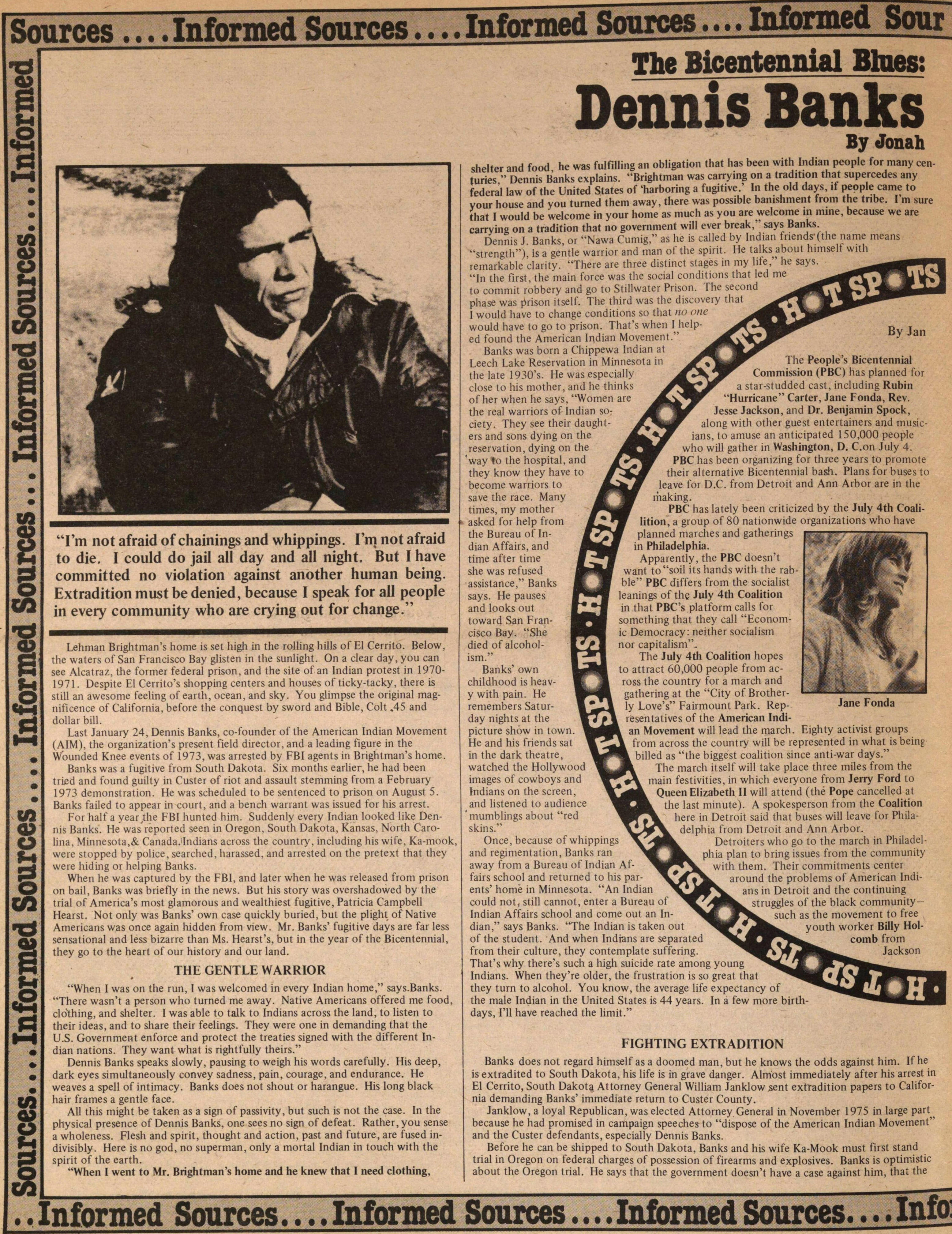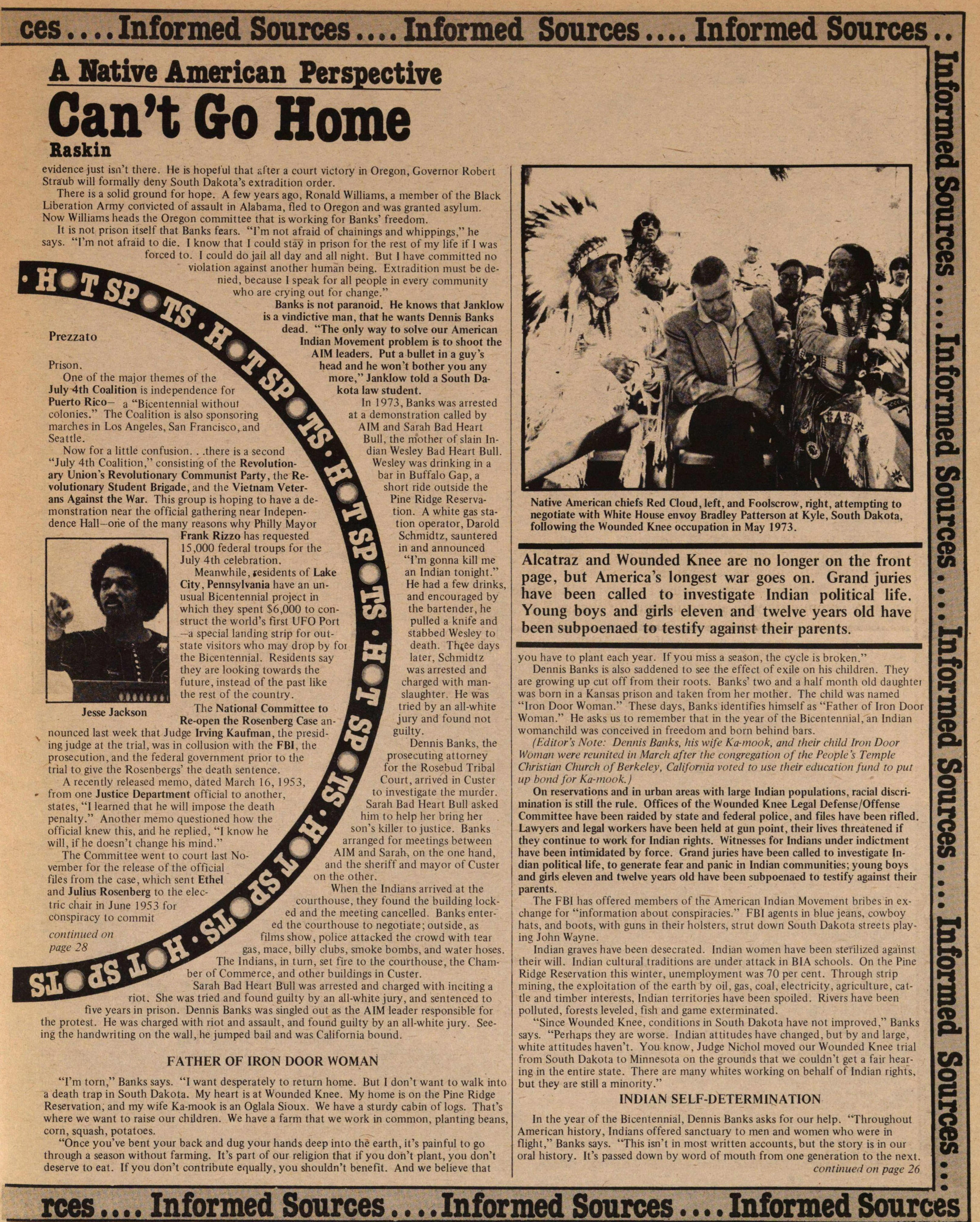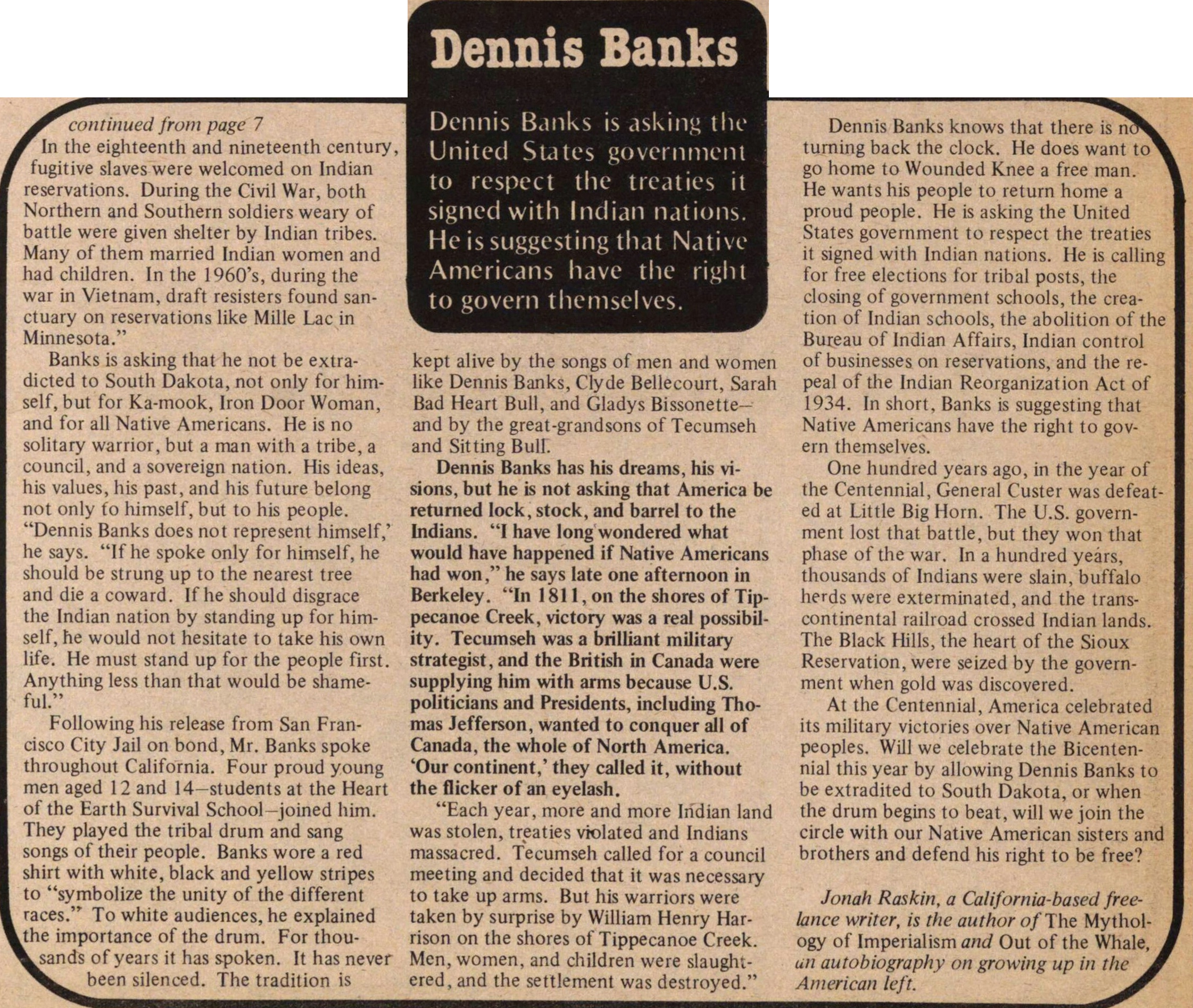The Bicentennial Blues



Lehman Brightman's home is set high in the rolling hills of El Cerrito. Below, the waters of San Francisco Bay glisten in the sunlight. On a clear day, you can see Alcatraz, the former federal prison, and the site of an Indian protest in 1970-1971 . Despite El Cerrito's shopping centers and houses of ticky-tacky, there is still an awesome feeling of earth, ocean, and sky. You glimpse the original magnificence of California, before the conquest by sword and Bible, Colt .45 and dollar bill.
Last January 24, Dennis Banks, co-founder of the American Indian Movement (AIM), the organization's present field director, and a leading figure in the Wounded Knee events of 1973, was arrested by FBI agents in Brightman's home.
Banks was a fugitive from South Dakota. Six months earlier, he had been tried and found guilty in Custer of riot and assault stemming from a February 1973 demonstration. He was scheduled to be sentenced to prison on August 5. Banks failed to appear in court, and a bench warrant was issued for his arrest.
For half a year, the FBI hunted him. Suddenly every Indian looked like Dennis Banks. He was reported seen in Oregon, South Dakota, Kansas, North Carolina, Minnesota,& Canada.Indians across the country, including his wife, Ka-mook, were stopped by police, searched, harassed, and arrested on the pretext that they were hiding or helping Banks.
When he was captured by the FBI, and later when he was released from prison on bail, Banks was briefly in the news. But his story was overshadowed by the trial of America's most glamorous and wealthiest fugitive, Patricia Campbell Hearst. Not only was Banks' own case quickly buried, but the plight of Native Americans was once again hidden from view. Mr. Banks' fugitive days are far less sensational and less bizarre than Ms. Hearst's, but in the year of the Bicentennial, they go to the heart of our history and our land.
THE GENTLE WARRIOR
"When I was on the run, I was welcomed in every Indian home," says.Banks. "There wasn't a person who turned me away. Native Americans offered me food, clothing, and shelter. I was able to talk to Indians across the land, to listen to their ideas, and to share their feelings. They were one in demanding that the U.S. Government enforce and protect the treaties signed with the different Indian nations. They want what is rightfully theirs."
Dennis Banks speaks slowly, pausing to weigh his words carefully. His deep, dark eyes simultaneously convey sadness, pain, courage, and endurance. He weaves a spell of intimacy. Banks does not shout or harangue. His long black hair frames a gentle face.
All this might be taken as a sign of passivity, but such is not the case. In the physical presence of Dennis Banks, one sees no sign of defeat. Rather.you sense a wholeness. Flesh and spirit, thought and action, past and future, are fused indivisibly. Here is no god, no superman, only a mortal Indian in touch with the spirit of the earth.
"When I went to Mr. Brightman's home and he knew that I need clothing, shelter and food he was fulfilling an obligation that has been with Indian people for many centuries " Dennis Banks explains. "Brightman was carrying on a tradition that supercedes any federal law of the United States of 'harboring a fugitive.' In the old days, if people carne to your house and you turned them away, there was possible banishment from the tribe. I m sure that I would be welcome in your home as much as you are welcome in mine, because we are carrying on a tradition that no government will ever break," says Banks.
Dennis J Banks, or "Nawa Cumig," as he is called by Indian friends (the name means "strength") is a gentle warrior and man of the spirit. He talks about himself with remarkable clarity. "There are three distinct stages in my life, he says. "In the first the main force was the social conditions that led me to commit robbery and go to Stillwater Prison. The second phase was prison itself. The third was the discovery that I would have to change conditions so that no one would have to go to prison. That's when I helped found the American Indian Movement."
Banks was born a Chippewa Indian at Leech Lake Reservation in Minnesota in the late 1930's. He was especially close to his mother, and he thinks a of her when he says, "Women are the real warriors of Indian society. They see their daughters and sons dying on the reservation, dying on the 'way to the hospital, and they know they have to become warriors to save the race. Many times, my mother asked for help from the Bureau of Indian Affairs, and time after time she was refused assistance," Banks says. He pauses and looks out toward San Francisco Bay. "She died of alcoholism."
Banks' own childhood is heavy with pain. He remembers Saturday nights at the picture show in town. He and his friends sat in the dark theatre, watched the Hollywood images of cowboys and Indians on the screen, and listened to audience 'mumblings about "red skins."
Once, because of whippings and regimentation, Banks ran away from a Bureau of Indian Affairs school and returned to his parents' home in Minnesota. "An Indian could not, still cannot, enter a Bureau of Indian Affairs school and come out an Indian," says Banks. "The Indian is taken out of the student. And when Indians are separated from their culture, they contemplate suffering. That's why there's such a high suicide rate among young " Indians. When they're older, the frustration is so great that they turn to alcohol. You know, the average life expectancy of the male Indian in the United States is 44 years. In a few more birthdays, I'll have reached the limit."
FIGHTING EXTRADITION
Banks does not regard himself as a doomed man, but he knows the odds against him. If he is extradited to South Dakota, his life is in grave danger. Almost immediately after his arrest in El Cerrito, South Dakota Attorney General William Janklow sent extradition papers to California demanding Banks' immediate return to Custer County.
Janklow, a loyal Republican, was elected Attorney General in November 1975 in large part because he had promised in campaign speeches to "dispose of the American Indian Movement" and the Custer defendants, especially Dennis Banks.
Before he can be shipped to South Dakota, Banks and his wife Ka-Mook must first stand trial in Oregon on federal charges of possession of firearms and explosives. Banks is optimistic about the Oregon trial. He says that the government doesn't have a case against him, that the evidence just isn't there.He is hopeful that after a court victory in Oregon, Governor Robert Straub will formally deny South Dakota's extradition order.
"I'm not afraid of chainings and whippings. I'm not afraid to die. I could do jail all day and all night. But I have committed no violation against another human being. Extradition must be denied, because I speak for all people in every community who are crying out for change."
There is a solid ground for hope. A few years ago, Ronald Williams, a member of the Black Liberation Army convicted of assault in Alabama, fled to Oregon and was granted asylum. Now Williams heads the Oregon committee that is working for Banks' freedom.
It is not prison itself that Banks fears. 'Im not afraid of chainings and whippings," he says. 'Tm not afraid to die. I know that I could stay in prison for the rest of my life if I was forced to. I could do jail all day and all night. But I have committed no violation against another human being. Extradition must be denied, because I speak for all people in every community who are crying out for change."
Banks is not paranoid. He knows that Janklow is a vindictive man, that he wants Dennis Banks dead. "The only way to solve our American Indian Movement problem is to shoot the AIM leaders. Put a bullet in a guy's head and he won't bother you any more," Janklow told a South Dakota law student.
In 1973, Banks was ai rested at a demonstration called by AIM and Sarah Bad Heart Bull, the mother of slain Ink dian Wesley Bad Heart Bull. Wesley was drinking in a bar in Buffalo Gap, a short ride outside the Pine Ridge Reservation. A white gas station operator, Darold Schmidtz, sauntered in and announced "l'm gonna kill me an Indian tonight." He had a few drinks, and encouraged by the bartender, he pulled a knife and stabbed Wesley to death. Three days later, Schmidlz was arrested and charged with manslaughter. He was tried by an all-white jury and found not guilty.
Dennis Banks, the prosecuting attorney for the Rosebud Tribal Court, arrived in Custer to investigate the murder. Sarah Bad Heart Bull asked him to help her bring her son's killer to justice. Banks arranged for meetings between AIM and Sarah, on the one hand, and the sheriff and mayor of Custer on the other.
When the Indians arrived at the courthouse, they found the building locked and the meeting cancelled. Banks entered the courthouse to negotiate; outside, as films show, police attacked the crowd with tear gas, mace, billy clubs, smoke bombs, and water hoses. The Indians, in turn, set fire to the courthouse, the chamber of Commerce, and other buildings in Custer.
Sarah Bad Heart Bull was arrested and charged with inciting a riot. She was tried and found guilty by an all-white jury, and sentenced to five years in prison.
Dennis Banks was singled out as the AIM leader responsible for the protest. He was charged with riot and assault, and found guilty by an all-white jury. Seeing the handwriting on the wall, he jumped bail and was California bound.
FATHER OF IRON DOOR WOMAN
"I'm torn," Banks says. "I want desperately to return home. But I don't want to walk into a death trap in South Dakota. My heart is at Wounded Knee. My home is on the Pine Ridge Reservation, and my wife Ka-mook is an Oglala Sioux. We have a sturdy cabin of" logs. That's where we want to raise our children. We have a farm that we work in common, planting beans, corn, squash, potatoes.
"Once you've bent your back and dug your hands deep into the earth, it's painful to go through a season without farming. It's part of our religion that if you don't plant, you don't deserve to eat. If you don't contribute equally, you shouldn't benefit. And we believe that you have to plant each year. If you miss a season, the cycle is broken."
Dermis Banks is also saddened to see the effect of exile on his children. They are growing up cut off from their roots. Banks' two and a half month old daughter was born in a Kansas prison and taken from her mother. The child was named "Iron Door Woman." These days, Banks identifies himself as "Father of Iron Door Woman." He asks us to remember that in the year of the Bicentennial, an Indian woman child was conceived in freedom and born behind bars.
(Editor's Note: Dennis Banks, his wife Ka-mook, and their child Iron Door Woman were reunited in March after the congregation of the People's Temple Christian Church of Berkeley, California voted to use their education fund to put up bond for Ka-mook.)
On reservations and in urban areas with large Indian populations, racial discrimination is still the rule. Offices of the Wounded Knee Legal Defense Offense Committee have been raided by state and federal police, and files have been rifled. Lawyers and legal workers have been held at gun point, their lives threatened if they continue to work for Indian rights. Witnesses for Indians under indictment have been intimidated by force. Grand juries have been called to investigate Indian political life, to generate fear and panic in Indian communities; young boys and girls eleven and twelve years old have been subpoenaed to testify against their parents.
The FBI has offered members of the American Indian Movement bribes in exchange for "information about conspiracies." FBI agents in blue jeans, cowboy hats, and boots, with guns in their holsters, strut down South Dakota streets playing John Wayne.
Indian graves have been desecrated. Indian women have been sterilized against their will. Indian cultural traditions are under attack in BIA schools. On the Pine Ridge Reservation this winter, unemployment was 70 per cent. Through strip mining, the exploitation of the earth by oil, gas, coal, electricity, agriculture, cattle and timber interests, Indian territories have been spoiled. Rivers have been polluted, forests leveled, fish and game exterminated.
"Since Wounded Knee, conditions in South Dakota have not improved," Banks says. "Perhaps they are worse. Indian attitudes have changed, but by and large, white attitudes haven't. You know, Judge Nichol moved our Wounded Knee trial from South Dakota to Minnesota on the grounds that we couldn't get a fair hearing in the entire state. There are many whites working on behalf of Indian rights, but they are still a minority."
INDIAN SELF-DETERMINATION
In the year of the Bicentennial, Dennis Banks asks for our help. "Throughout American history, Indians offered sanctuary to men and women who were in flight," Banks says. "This isn't in most written accounts, but the story is in our oral history. It's passed down by word of mouth from one generation to the next. continued on page 26
Alcatraz and Wounded Knee are no longer on the front page, but America's longest war goes on. Grand juries have been called to investigate Indian political life. Young boys and girls eleven and twelve years old have been subpoenaed to testify against their parents.
.... Informed Sources .... Informed Sources .... Informed Sources . . I f en rees .... Inf ormed Sources .... Informed Sources .... Informed Sources
Article
Subjects
Freeing John Sinclair
Jonah Raskin
American Indian Movement [AIM]
American Indians
Native Americans
Wounded Knee
Stillwater Prison
Chippewa
Bureau of Indian Affairs
Black Liberation Army
Rosebud Tribal Court
Oglala Sioux Tribe
People's Temple Christian Church of Berkeley California
U.S. Civil War
San Francisco City Jail
Heart of the Earth Survival School
Old News
Ann Arbor Sun
Lehman Brightman
Dennis Banks
Darlene Ka-Mook Nichols
William Janklow
Robert Straub
Ronald Williams
Sarah Bad Heart Bull
Wesley Bad Heart Bull
Darold Schmidtz
Red Cloud
Foolscrow
Bradley Patterson
Iron Door Woman
Clyde Bellecourt
Gladys Bissonette
Tecumseh
TaTanka YoTanka [Sitting Bull]
Thomas Jefferson
William Henry Harrison
El Cerrito CA
San Francisco
South Dakota
Wounded Knee
Leech Lake Reservation
Minnesota
San Francisco Bay
Custer County South Dakota
Alabama
Oregon
Buffalo Gap South Dakota
Pine Ridge Reservation
Kyle South Dakota
Alcatraz Island
Mille Lac Reservation
Berkeley California
Tippecanoe Creek
Black Hills South Dakota